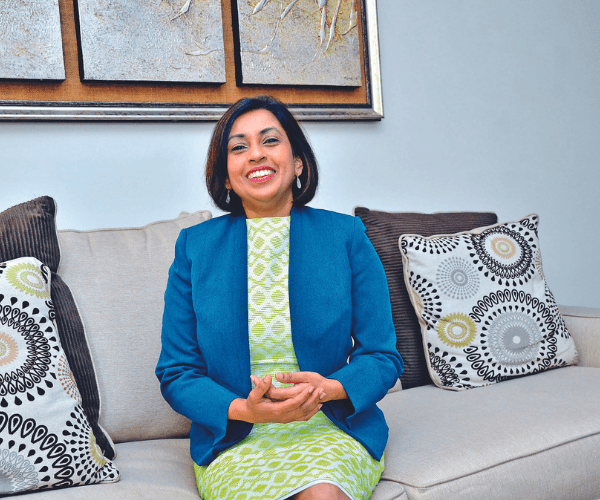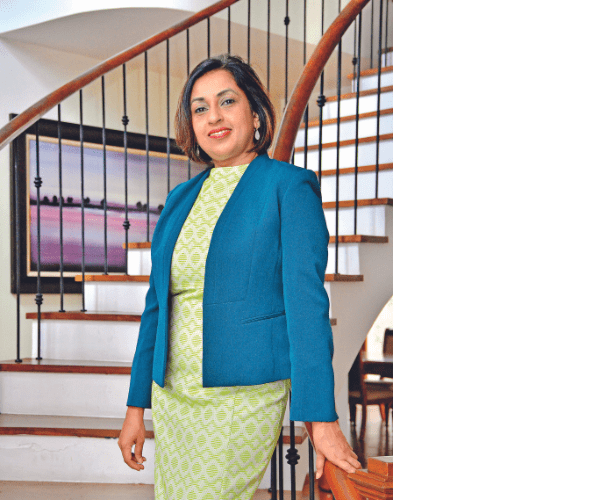
Feb 06 2023.
views 527Cancer is a leading cause of death worldwide according to World Health Organisation statistics. While a few cases could be due to hereditary reasons, a majority of cancers are said to develop after birth due to various genetic changes and behavioural patterns. Dr Chandanamali Punchihewa, Chief Executive Officer at Genelabs Medical (Pvt) Ltd aspires to provide updated and affordable testing facilities for cancer patients which would in turn help them diagnose their illnesses for early treatments. Amidst challenges and various obstacles, Dr Punchihewa has been able to serve society with a team of individuals who have a wealth of knowledge and experience in the field. Recently, Dr Punchihewa was adjudged the Woman Entrepreneur of the Year at the recently concluded Women’s Chamber of Industry and Commerce Awards ceremony in recognition of her service to the nation. Dr Punchihewa shared her story with us. Excerpts:

Q Tell us about yourself?
I am from a family of six. I grew up in Bandarawela, and studied at Little Flower Girl’s School. I usually got good grades in class but didn’t have the practice of studying after-school or attending private tuition classes until I started A/Ls. I got selected to Visaka Vidyalaya in Colombo based on the Grade 5 scholarship marks, attended the school for a few months, but went back to Bandarawela since I missed the carefree life at Bandarawela. I got through O/Ls with a record as one of the first students in the history of the school to get Distinctions for all 8 subjects.
Then I moved to Colombo and studied A/Ls at Royal Institute. Although the intention was to go to Medical College afterwards, I didn’t qualify based on my A/L marks. So, I entered the University of Colombo and got a BSc degree specializing in Molecular Biology and Biochemistry. While waiting for University entrance, I also took the entrance exam for the Sri Lanka Law College, and having passed that, I also studied at the Law College. In 2000, I completed my degree and also took oaths as an Attorney-at-Law. I worked for about a year in a Law Firm, but having identified my passion for science, I gave up the practice of law and went to the USA on a scholarship to read for my PhD in science. Once completed, I joined the St. Jude Children’s Research Hospital in the USA as a postdoctoral fellow and continued to work there as a researcher until I returned to Sri Lanka in 2014.
Q What inspired you to study life sciences and become a doctor?
Although I liked learning in general, I actually preferred maths over science as a subject, since maths required relatively less studying. Even after O/Ls, I wasn’t sure about what field to select and what I wanted to be. However, when I was in Grade 8 I remember thinking I should be a doctor since during that time we were at war with the LTTE and with a sense of patriotism I wanted to help our soldiers who were fighting and getting wounded in the North. I thought the only practical way I would get to go to war-torn regions and would get to help them as if I was a doctor. However, my decision to pick life sciences was mainly due to a comment by my father because he thought that being a doctor is a good profession for a woman. While in an indecisive stage that small nudge helped, so I selected life sciences, with the goal of becoming a doctor. But I didn’t get sufficient marks to enter Medical College, so I decided to pursue a BSc degree, for the sake of having a degree, since I wanted to follow plan B of becoming a lawyer.
However, I was fortunate because the University of Colombo initiated a Special Degree in Molecular Biology and Biochemistry, starting with us and I was one of the first six students who got selected to follow this course. This decision entirely changed my path.
The programme was spearheaded by two talented professors, Dr Maya Gunasekara, who became a role model to me, and Dr Nalin Goonesekara, an exceptionally smart scientist. They had such a passion for the science they were teaching, it was infectious, and I developed a special interest towards these subjects. I wanted to learn more and engage in research in these areas, so I gave up the profession of Law and followed the academic path of PhD in science.
Q Science is quite a vast field. Why did you choose to do cancer research in particular?
DNA is the central machinery in each cell in our body that stores all the information needed for its function and is the blueprint of life. Understanding how this information is coded in DNA, and how its decoded to carry out all functions of living beings, is an intriguing field by itself. Cancer happens when this coding and decoding go awry. As I learnt about DNA and its functions as an undergraduate student, I was fascinated by how this microscopical structure that you cannot see with the naked eyes, could give rise to cancers, and how the work done by scientists all over the world unravel the mysteries of the working of this powerhouse and the ways it goes out of control. This fascination made me want to work like them, and help understand more details about this disease that will eventually help hundreds of thousands of patients worldwide.
Q Let’s talk about Genelabs and the services offered to patients.
Genelabs Medical Pvt Ltd was established in 2018, with the vision of making advanced genetic testing that is available elsewhere in the world accessible to Sri Lankans. We have had access to the latest drugs, critical vaccines and advanced diagnostics; but many critical genetic tests were being outsourced to other countries due to the lack of testing facilities in Sri Lanka. We wanted to minimize the outsourcing, and retain the dollars in Sri Lanka, while giving our patients convenient access to important tests at a lower cost. We offer many cancer tests that are useful for diagnosis and treatment, as well as identifying one's risk of hereditary cancers, tests that can predict the likelihood of having a child with Down or certain other syndromes early in pregnancy, tests that can identify the best match for organ transplantations, tests that can identify hard-to-detect infections, and many more.
In addition to the patients, we also serve researchers from universities and other institutions by carrying out certain components of their testing work using our expertise and the facility. We have done such work for many local teams, as well as for international groups. For those who want to learn genetic testing techniques, we also offer training and workshops. So we contribute to society in multiple ways through Genelabs.
Q Sri Lanka has an alarming number of cancer patients. What are the reasons for people to develop cancer in this day and age, apart from genetics?
Actually, the cancer rates in Sri Lanka are much lower than in many other countries in the world. Many European countries have higher cancer incidence rates in the world, followed by North and South America. Cancer is a genetic test, meaning people develop cancer due to a change in genes. In a small proportion, like in about 10% of cancer cases, the reason is a hereditary change in a gene. But the majority occur due to genetic changes that happened after birth. This could be due to random errors that happen during cell division, which is an integral feature of living beings, or due to external factors like smoking, UV rays, alcohol, processed food, pollution and other environmental factors. While some cancers can be prevented, others cannot be prevented.
Q You were recently adjudged the Woman Entrepreneur of the Year at WCIC Awards. How do you feel about winning this award?
I am really honoured to have won this award. Until my name was announced at the awards ceremony, I did not know that I was the winner, and it was such a pleasant surprise. I am happy that my efforts to establish something much needed in the country were recognized. It was challenging and hard work from the day I decided to start this venture and it continues to be so. As I found out the hard way, the systems and infrastructure in the country to promote entrepreneurship or support new ventures need a lot of improvement. In such an environment, I appreciate the efforts by organizations such as WCIC to recognize entrepreneurs and encourage them.

Q There’s a continuous dialogue about encouraging females to play an active role in STEM careers. Do you think the local education system needs to be improved with technology etc. if there’s a plan to absorb the youth into these careers?
Definitely. I think our education system has been, and still is, focused towards more theory-based learning than real practical experience. In STEM careers practical exposure and experience are probably more important than the grades in a written exam, so the education system should incorporate more ways for students to get practical experience, encourage them to think outside the box, and develop their soft skills in order make them ready for such careers. At the same time, when it comes to females, we also should get them out of cultural barriers of being required to be perfect wives and mothers that society expects if we are to absorb them into any career, be it in STEM or otherwise.
Q What’s the most satisfying part about the work that you do?
It’s the ability to help another human with every single test we do. The work we do helps a patient with the diagnosis or treatment of a disease. Sometimes the results would make a difference between life and death for the patient. So by doing it accurately, in a timely manner, and at a lower cost than any other laboratory elsewhere in the world, we get the satisfaction of being able to serve society with our knowledge and experience.
Q The most challenging…?
While the kind of tests we do are technically challenging and the test performance and data analysis require patience, attention to detail, and analytical skills, the most challenging part of our work right now is maintaining a continuous operation in a financially unstable country. The current hardships of procuring chemicals and other supplies, the high cost and taxes of items which in turn increase our product costs, the decreased affordability of the patients, and retaining the trained and capable staff within the country are some of the few challenges that we have encountered with this economic downturn.
Q Future aspirations
The genetic testing field is a rapidly advancing area and my aspiration is to keep up with the developments in science and technology in order to continue to offer useful tests to patients. Also, given the importance of foreign exchange to the country, and the market trends worldwide, I also wish to spread our wings outside of Sri Lanka.
0 Comments